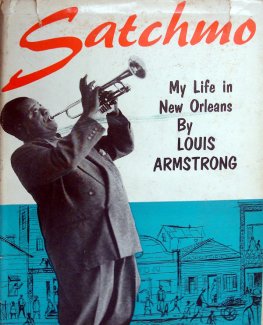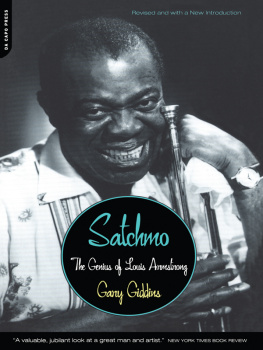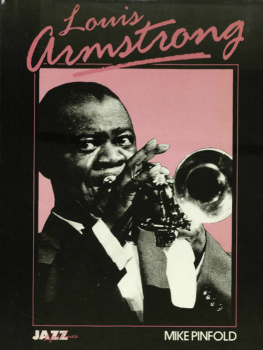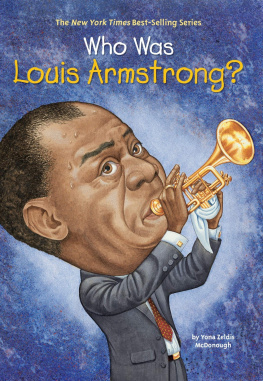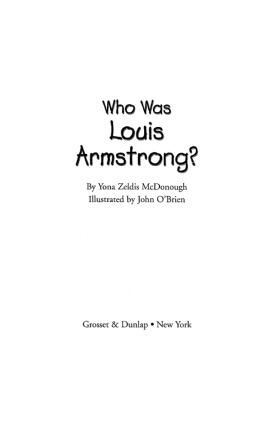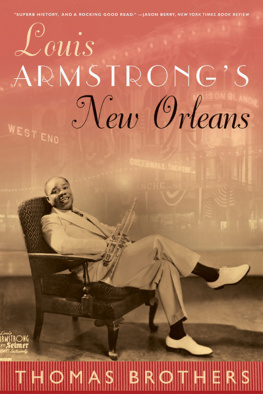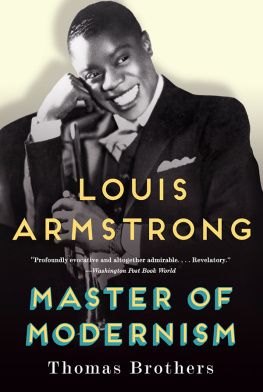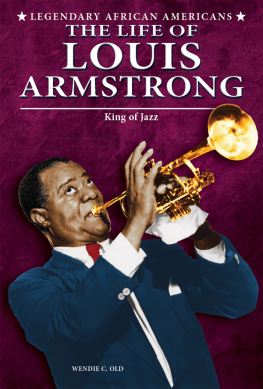Louis Armstrong - Satchmo: My Life in New Orleans
Here you can read online Louis Armstrong - Satchmo: My Life in New Orleans full text of the book (entire story) in english for free. Download pdf and epub, get meaning, cover and reviews about this ebook. year: 1954, publisher: Prentice-Hall, Inc, genre: History. Description of the work, (preface) as well as reviews are available. Best literature library LitArk.com created for fans of good reading and offers a wide selection of genres:
Romance novel
Science fiction
Adventure
Detective
Science
History
Home and family
Prose
Art
Politics
Computer
Non-fiction
Religion
Business
Children
Humor
Choose a favorite category and find really read worthwhile books. Enjoy immersion in the world of imagination, feel the emotions of the characters or learn something new for yourself, make an fascinating discovery.
- Book:Satchmo: My Life in New Orleans
- Author:
- Publisher:Prentice-Hall, Inc
- Genre:
- Year:1954
- Rating:4 / 5
- Favourites:Add to favourites
- Your mark:
- 80
- 1
- 2
- 3
- 4
- 5
Satchmo: My Life in New Orleans: summary, description and annotation
We offer to read an annotation, description, summary or preface (depends on what the author of the book "Satchmo: My Life in New Orleans" wrote himself). If you haven't found the necessary information about the book — write in the comments, we will try to find it.
Satchmo: My Life in New Orleans — read online for free the complete book (whole text) full work
Below is the text of the book, divided by pages. System saving the place of the last page read, allows you to conveniently read the book "Satchmo: My Life in New Orleans" online for free, without having to search again every time where you left off. Put a bookmark, and you can go to the page where you finished reading at any time.
Font size:
Interval:
Bookmark:
Satchmo
My Life in New Orleans
chapter 1
When I was born in 1900 my father, Willie Armstrong, and my mother, May Ann or Mayann as she was called were living on a little street called James Alley. Only one block long, James Alley is located in the crowded section of New Orleans known as Back o' Town. It is one of the four great sections into which the city is divided. The others are Uptown, Downtown and Front o' Town, and each of these quarters has its own little traits.
James Alley not Jane Alley as some people call it lies in the very heart of what is called The Battlefield because the toughest characters in town used to live there, and would shoot and fight so much. In that one block between Gravier and Perdido Streets more people were crowded than you ever saw in your life. There were churchpeople, gamblers, hustlers, cheap pimps, thieves, prostitutes and lots of children. There were bars, honky-tonks and saloons, and lots of women walking the streets for tricks to take to their "pads," as they called their rooms.
Mayann told me that the night I was born there was a great big shooting scrape in the Alley and the two guys killed each other. It was the Fourth of July, a big holiday in New Orleans, when almost anything can happen. Pretty near everybody celebrates with pistols, shot guns, or any other weapon that's handy.
When I was born my mother and father lived with my grandmother, Mrs. Josephine Armstrong (bless her heart!), but they did not stay with her long. They used to quarrel something awful, and finally the blow came. My mother moved away, leaving me with grandma. My father went in another direction to live with another woman. My mother went to a place at Liberty and Perdido Streets in a neighborhood filled with cheap prostitutes who did not make as much money for their time as the whores in Storyville, the famous red-light district. Whether my mother did any hustling, I cannot say. If she did, she certainly kept it out of my sight. One thing is certain: everybody from the churchfolks to the lowest roughneck treated her with the greatest respect. She was glad to say hello to everybody and she always held her head up. She never envied anybody. I guess I must have inherited this trait from Mayann.
When I was a year old my father went to work in a turpentine factory out by James Alley, where he stayed till he died in 1933. He stayed there so long he almost became a part of the place, and he could hire and fire the colored guys who worked under him. From the time my parents separated I did not see my father again until I had grown to a pretty good size, and I did not see Mayann for a long time either.
Grandmother sent me to school and she took in washing and ironing. When I helped her deliver the clothes to the white folks she would give me a nickel. Gee, I thought I was rich! Days I did not have to go to school grandmother took me with her when she had to do washing and housework for one of the white folks. While she was working I used to play games with the little white boys out in the yard. Hide-and-go-seek was one of the games we used to play, and every time we played I was It. And every time I would hide those clever little white kids always found me. That sure would get my goat. Even when I was at home or in kindergarten getting my lessons I kept wishing grandma would hurry up and go back to her washing job so I could find a place to hide where they could not find me.
One real hot summer day those little white kids and myself were having the time of our lives playing hide-and-go-seek. And of course I was It. I kept wondering and figuring where, oh where was I going to hide. Finally I looked at grandma who was leaning over a wash tub working like mad. The placket in the back of her Mother Hubbard skirt was flopping wide open. That gave me the idea. I made a mad dash over to her and got up under her dress before the kids could find out where I had gone. For a long time I heard those kids running around and saying "where did he go?" Just as they were about to give up the search I stuck my head out of grandma's placket and went "P-f-f-f-f-f! "
"Oh, there you are. We've found you," they shouted.
"No siree," I said. "You wouldn't of found me if I had not stuck my head out."
Ever since I was a baby I have had great love for my grandmother. She spent the best of her days raising me, and teaching me right from wrong. Whenever I did something she thought I ought to get a whipping for, she sent me out to get a switch from the big old Chinaball tree in her yard.
"You have been a bad boy," she would say. "I am going to give you a good licking."
With tears in my eyes I would go to the tree and return with the smallest switch I could find. Generally she would laugh and let me off. However, when she was really angry she would give me a whipping for everything wrong I had done for weeks. Mayann must have adopted this system, for when I lived with her later on she would swing on me just the same way grand mother did.
I remember my great-grandmother real well too. She lived to be more than ninety. From her I must have inherited my energy. Now at fifty-four I feel like a young man just out of school and eager to go out in the world to really live my life with my horn.
In those days, of course, I did not know a horn from a comb. I was going to church regularly for both grandma and my great-grandmother were Christian women, and between them they kept me in school, church and Sunday school. In church and Sunday school I did a whole lot of singing. That, I guess, is how I acquired my singing tactics.
I took part in everything that happened at school. Both the children and the teachers liked me, but I never wanted to be a teacher's pet. However, even when I was very young I was conscientious about everything I did. At church my heart went into every hymn I sang. I am still a great believer and I go to church whenever I get the chance.
After two years my father quit the woman he was living with, and went back to Mayann. The result was my sister Beatrice, who was later nicknamed "Mama Lucy." I was still with my grandmother when she was born, and I did not see her until I was five years old.
One summer there was a terrible drought. It had not rained for months, and there was not a drop of water to be found. In those days big cisterns were kept in the yards to catch rain water. When the cisterns were filled with water it was easy to get all the water that was needed. But this time the cisterns were empty, and everybody on James Alley was frantic as the dickens. The House of Detention stables on the corner of James Alley and Gravier Street saved the day. There was water at the stable, and the drivers let us bring empty beer barrels and fill them up.
In front of the stables was the House of Detention itself, occupying a whole square block. There prisoners were sent with "thirty days to six months." The prison ers were used to clean the public markets all over the city, and they were taken to and from their work in large wagons. Those who worked in the markets had their sentences reduced from thirty days to nineteen. In those days New Orleans had fine big horses to pull the patrol wagons and the Black Maria. I used to look at those horses and wish I could ride on one some day. And finally I did. Gee, was I thrilled!
One day when I was getting water along with the rest of the neighbors on James Alley an elderly lady who was a friend of Mayann's came to my grandmother's to tell her that Mayann was very sick and that she and my dad had broken up again. My mother did not know where dad was or if he was coming back. She had been left alone with her baby my sister Beatrice (or Mama Lucy) with no one to take care of her. The woman asked grandmother if she would let me go to Mayann and help out. Being the grand person she was, grandma consented right away to let me go to my mother's bedside. With tears in her eyes she started to put my little clothes on me.
Font size:
Interval:
Bookmark:
Similar books «Satchmo: My Life in New Orleans»
Look at similar books to Satchmo: My Life in New Orleans. We have selected literature similar in name and meaning in the hope of providing readers with more options to find new, interesting, not yet read works.
Discussion, reviews of the book Satchmo: My Life in New Orleans and just readers' own opinions. Leave your comments, write what you think about the work, its meaning or the main characters. Specify what exactly you liked and what you didn't like, and why you think so.

